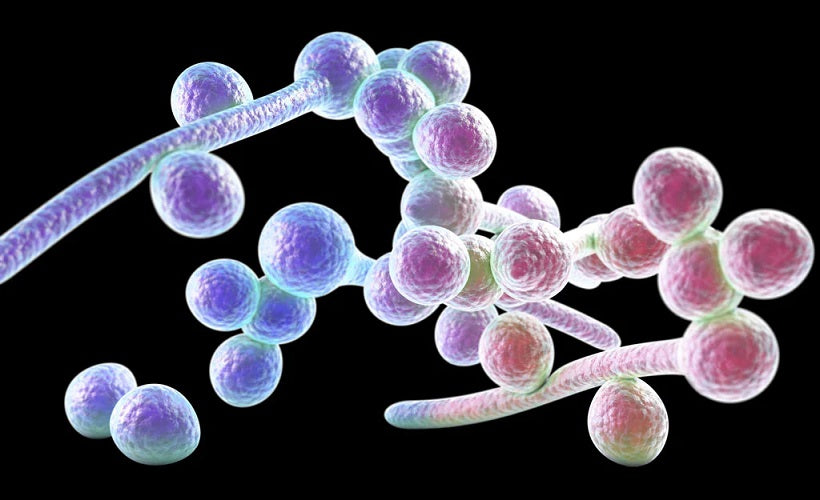
PCOS and Ovulation – Everything You Need to Know
By Tahlia Thomas

Many women with Polycystic Ovarian Syndrome (PCOS) don’t ovulate at all or ovulate infrequently. High levels of androgens and other male hormones, such as testosterone, as well as high insulin levels, can affect the menstrual cycle and prevent ovulation (the release of an egg from the ovary). When an egg is not released on a regular basis, this is called anovulation. You can still have a menstrual bleed, but they’re often irregular, making it quite difficult to track ovulation.
How to tell when you're ovulating if you have PCOS
Some ovulation testing kits don’t work for women with PCOS. These kits are designed to detect a surge in luteinising hormone (LH), which is already higher in women with PCOS. Results can be inaccurate and often give a false positive.
If you have a menstrual bleed you are more likely to ovulate, but this isn’t guaranteed. Your cycle might just be anovulatory and no egg is released. For this reason, tracking is really important. There are two things that you need to look out for while you’re tracking ovulation during your menstrual cycle – basal body temperature and cervical mucus.
PCOS Ovulation Signs & Symptoms
Basal body temperature
Basal body temperature (BBT) is simply your lowest body temperature during a 24-hour cycle. This is usually achieved during rest, so the best time to take your BBT is first thing in the morning upon waking.
BBT usually ranges from 97℉ to 97.5℉ (36.11℃ to 36.38 ℃) prior to ovulation. There may be a slight dip in temperature when you ovulate, followed by an increase to about 97.6℉ to 98.6℉ (36.44℃ to 37℃) after ovulation. This rise in temperature is due to the production of progesterone by the corpus luteum during the luteal phase of your cycle. Temperature normally remains elevated for the next couple of weeks, usually until your next period. If your temperature remains elevated for more than 18 days following ovulation, it can be a sign that you’re pregnant.

To be sure that you have ovulated, you need to have a spike in your temperature and maintain that higher temperature for at least two to three days. For this reason, it’s advisable to use a digital or special basal thermometer to obtain very accurate readings. These gadgets are usually precise enough to track even the slightest temperature changes.
Cervical mucus
The other thing you need to monitor is your cervical mucus. The consistency of cervical mucus around the time of ovulation is similar to that of an egg white, so it’s usually clear and quite stringy. Cervical mucus is also more abundant during ovulation compared to other phases of your cycle. After ovulation, the amount of cervical mucus decreases and becomes thick and sticky. In combination with basal body temperature readings, monitoring your cervical mucus is a good indicator of whether you’re ovulating or not.
Other ways to detect ovulation if you have PCOS
Cervical position and feel
During the fertile phase of your menstrual cycle, the cervix feels different so you can use the indications to detect ovulation. The cervix is the neck of the uterus which you can feel through the vagina. Insert a clean finger inside – your cervix will be higher and feel soft like your lips around the time of ovulation. It also feels wet and more open. When you’re not ovulating, the cervix is lower and feels harder – more like the tip of your nose.
Blood tests
You can also have blood tests taken. Normally they are taken on or around the 21st day of your cycle. If there’s an increase in your progesterone, this can indicate that you’ve just ovulated. Menstrual cycles in women with PCOS are often so irregular, so getting that 21-day test done can be sort of tricky.
Ovulation pain
Some women experience mild cramping or discomfort at the time of ovulation. Ovulation pain can last from minutes to a few hours and is generally felt on one side of the lower abdomen (depending on which ovary releases an egg). You can tell that you’re most likely ovulating when this mild cramping occurs a couple of weeks prior to the next expected menstrual bleed. However, pain in the lower abdomen may also be caused by ovarian cysts. Cystic ovaries are often due to hormonal imbalances associated with inflammation or insulin resistance. Pain caused by ovarian cysts will be more persistent compared to ovulation pain, which only happens at the time an egg is released.
Emotional changes
Listen to your body. You’ll usually feel more sexual and sensitive around the time of ovulation.
How to start ovulation with PCOS
PCOS is among the most common causes of female infertility and fertility drugs are often prescribed to improve the chances of conception. However, you can increase your chances of ovulating with lifestyle changes and a diet specifically designed to fight inflammation and enhance fertility. Focus on whole foods that are high in fibre, vegetable proteins and healthy fats to create more balance in the body.
REFERENCES
Monash University. International evidence-based guideline for the assessment and management of polycystic ovary syndrome. 2018. Melbourne, Australia.
https://www.monash.edu/medicine/sphpm/mchri/pcos/guideline
Joham AE, Boyle JA, Ranasinha S, Zoungas S, Teede HJ. Contraception use and pregnancy outcomes in women with polycystic ovary syndrome: data from the Australian Longitudinal Study on Women's Health. Human Reproduction (Oxford, England). 2014 Apr;29(4):802–8.
https://pubmed.ncbi.nlm.nih.gov/24549213/
Goodman et al. American Association of Clinical Endocrinologists, American College of Endocrinology, and Androgen Excess and PCOS Society Disease State Clinical Review: guide to the best practises in the evaluation and treatment of Polycystic Ovary Syndrome – part 1. Endocrine Practice. 2015 Nov;21(11):1291–300.
https://pubmed.ncbi.nlm.nih.gov/26509855/






Leave a comment
This site is protected by hCaptcha and the hCaptcha Privacy Policy and Terms of Service apply.